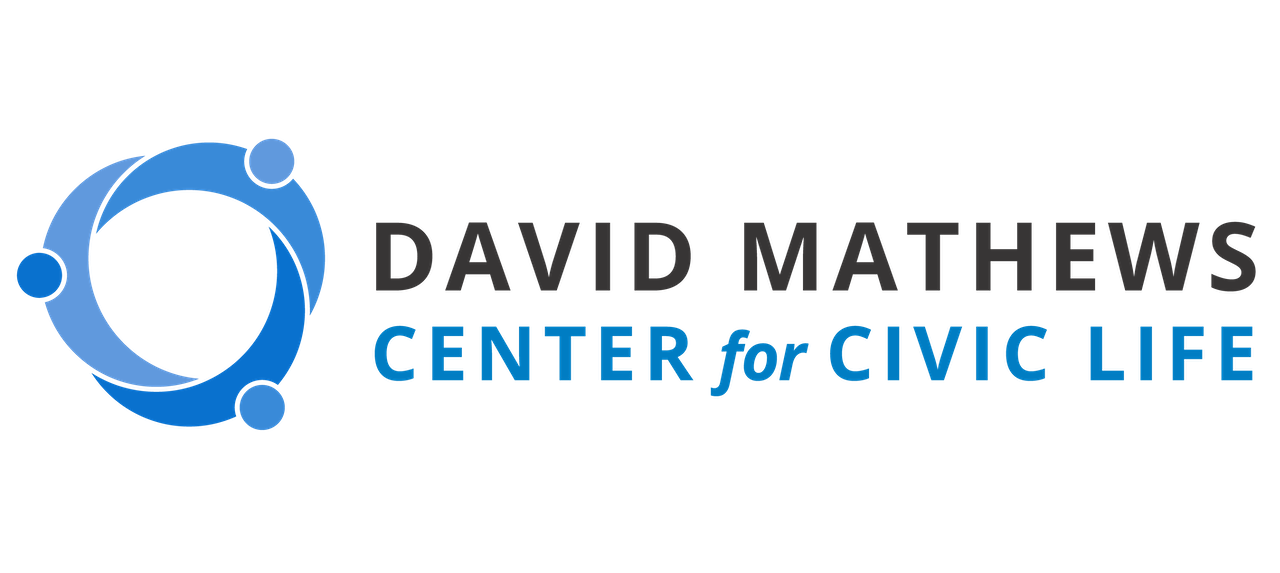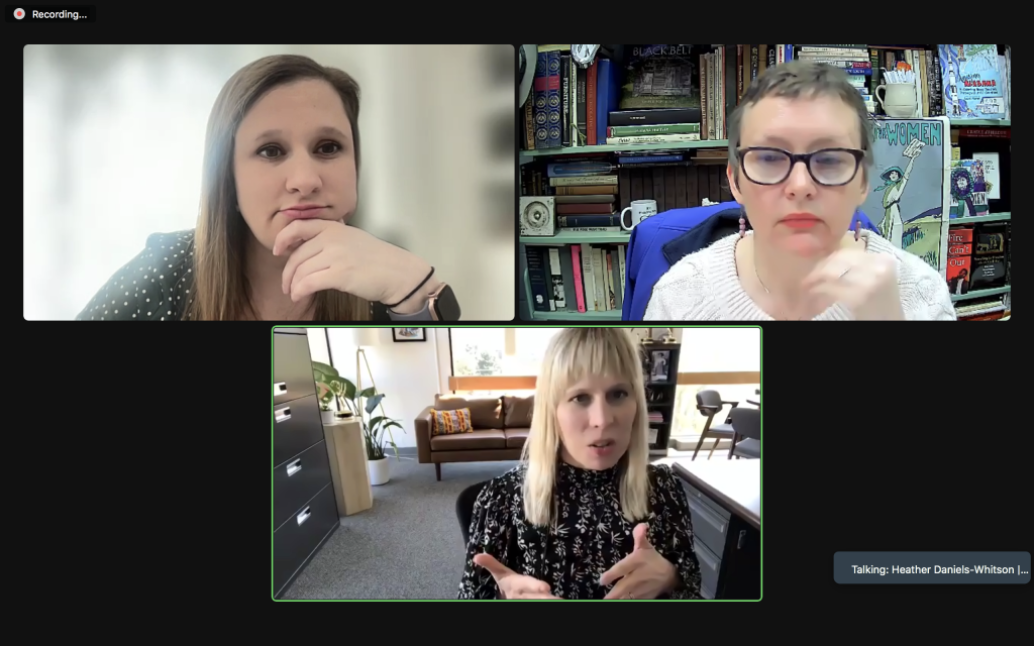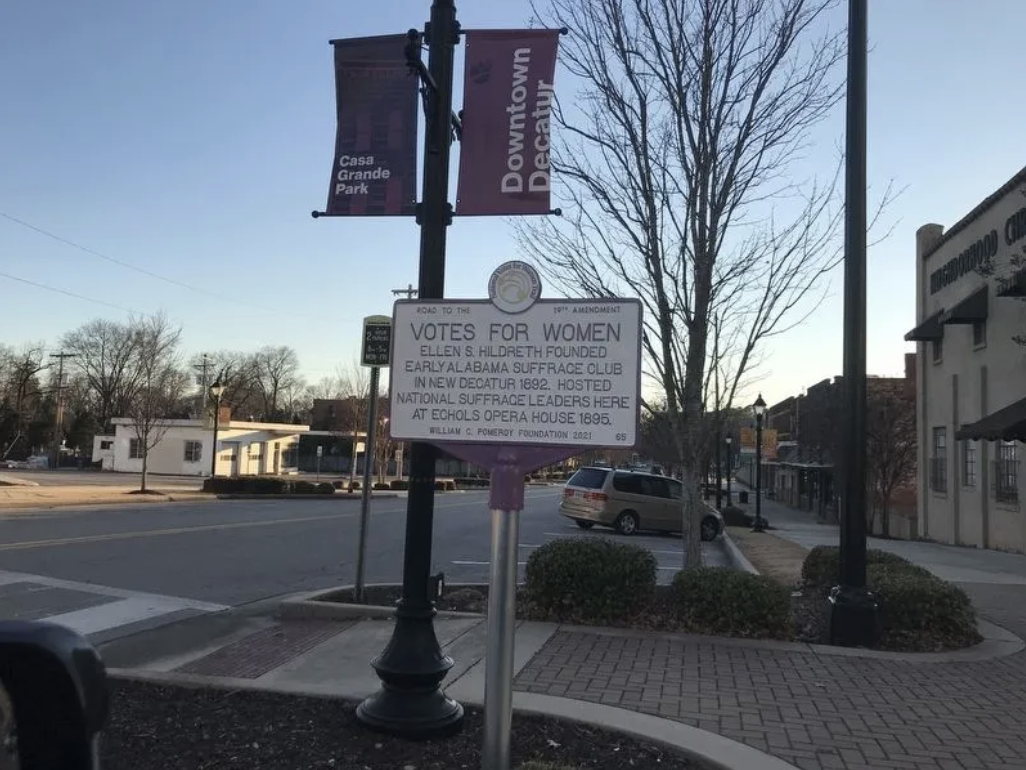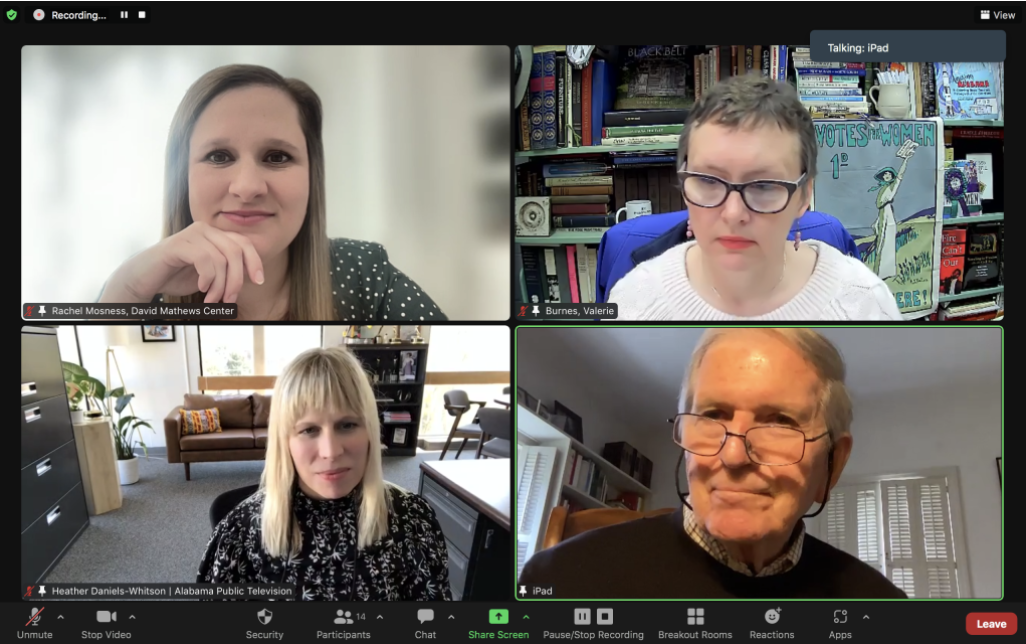Applied Democracy Exchanges: The Women Who Helped Shape the State
For the third session of Applied Democracy Exchanges, the Mathews Center invited Dr. Valerie Burnes from the University of West Alabama and Heather Daniels-Whitson from Alabama Public Television to share the work of their organizations in uplifting Alabama’s most inspiring women throughout our state’s history.
On Thursday, March 16, participants met online to discuss the perils of democracy both domestically and abroad. In recognition of Women’s History Month and the recent centennial of the ratification of the 19th amendment in 2020, March’s exchange was titled “100 Years and Counting: Women’s Advancement in Alabama.”
Dr. Burnes acts as the executive secretary of the Alabama Women’s Hall of Fame. Since its founding in 1970, 99 women have been inducted due to their exceptional achievements and lasting legacies. In 2023, two lawyers were inducted, including Alice Lee, sister of Harper Lee and the oldest working lawyer in the nation; and Mahala Ashley Dickerson, the first African-American woman admitted to the bar in Alabama, Indiana, and Alaska. “These women were just doing what they needed to do when they saw a need,” Dr. Burnes said. “They were not meeting this need for any recognition at all.”
As the Chair of Alabama’s chapter of the National Women’s Suffrage Trail, in 2020, Dr. Burnes identified key sites across the state that were instrumental in the women’s suffrage movement in the early twentieth century. Together with Dr. Alex Colvin of the Alabama Department of Archives and History, six markers were installed (in Mobile, Huntsville, Decatur, Birmingham, Selma, and Tuskegee) to highlight local women’s history and the contributions made to the overall women’s rights movement.
When asked why preserving women’s history in Alabama helps society and democracy today, Dr. Burnes said representation is a powerful tool for many modern women. “If you feel you’re in an underrepresented group, the best thing you can do is see yourself represented in places, especially in the general public through advertising and media.”
Dr. David Mathews also provided context on how women’s interest groups within communities led to national change, as with the Women’s Christian Temperance Union, which was formed by women already invested in other social justice movements coming together towards a united goal. “These women realized they would always be dealing with the aftermath and effects unless they could directly change the laws that created these issues in the first place,” he noted. “There were a lot of women involved that put their reputation and marriages on the line and still did the work, so we should appreciate the opportunities we have now.”
Another significant component of the celebration of the centennial of women’s suffrage was the vast amount of digital resources that were made available to the public and education institutions courtesy of Alabama Public Television. Heather Daniels-Whitson, APT’S Director of Digital Media, described the responsibility of the media to the public, saying “As part of the public media world, it is our job and civic duty to provide educational resources in order to maintain an informed public.”
When it comes to resource development, Heather says one of the biggest challenges is capacity. “There are so many great stories happening across the state that you want to be able to highlight, and we are approached with inquiries about events and other projects, we have to determine which ones to focus on first and how we can incorporate them into an already existing project. We want to create a starting point for people to learn and inspire them to do even more research on their own.”
One of the resources created in recognition of the centennial of women’s suffrage was They Dared, a program highlighting twelve exceptional women, both inside and outside the suffrage movement in Alabama. These women were both very well-known historic figures, such as Adella Hunt Logan, and lesser-known figures such as Evelyn Daniel Anderson, who enacted a legislative change to become the first teacher with disabilities in Alabama.
Another prominent resource made for younger students, Unstoppable, featured a guided tour of both Seneca Falls, NY, and Washington D.C. led by student reporters. Alabama Representative Terri Sewell joined to provide her personal experience as one of the first women to politically represent Alabama at the national level.
The Mathews Center and APT partner together for the creation of Votes for Women: Suffrage 1915 to honor the centennial in 2020. Former DMC Executive Director Cristin Brawner described that process from planning to printing. “It was one of the fastest historical issues guides ever created at the Mathews Center. APT reached out in February, and the guide was completed by the end of March.” Many collaborators assisted in the creation of the guide, from historians to community leaders to teachers, in order to properly engage students and young people with their local history. “Our goal with historic guides is helping young people have the opportunity to engage in history in a way that allows them to reflect on issues today and build civic skills and be active citizens.”
Our next ADE session will occur on Thursday, April 20, at 12:00 PM CDT online via Zoom. We will be exploring the connection between a community’s access to healthcare and the strength of its civic engagement. Our guest speakers will be Dr. John Dorsey, Founder and Executive Director of Project Horseshoe Farm, and Kristin Boggs, Executive Director of the Alabama Schweitzer Fellowship. You can register at the ADE Eventbrite page here.






